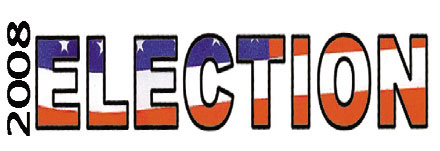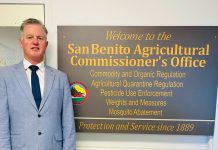Americans stormed to the polls Tuesday in what could be record
numbers, anxious about their country and eager to settle a historic
election battle between Democrat Barack Obama and Republican John
McCain.
Steven Thomma – McClatchy Newspapers
WASHINGTON
Americans stormed to the polls Tuesday in what could be record numbers, anxious about their country and eager to settle a historic election battle between Democrat Barack Obama and Republican John McCain.
In the first possible sign that Obama had a chance of winning in Republican areas, the once reliably Republican states of Georgia, Indiana and Virginia all were considered too close to call shortly after their polls closed.
Obama was declared the winner in Pennsylvania, the one state that voted Democratic in the last election that McCain thought he had a chance of winning.
Several battleground states were too close to call, including Alabama, Florida, Georgia, Missouri, New Hampshire and Virginia.
Obama took several Democratic states as expected: Connecticut, Delaware, Illinois, Maryland, Massachusetts and New Jersey, as well as the District of Columbia. He also took three out of four Electoral College votes from Maine, which is one of two states that splits its votes; the other is Nebraska.
McCain took several Republican states as expected, including Kentucky, Oklahoma, South Carolina and Tennessee.
In states from coast to coast, voters lined up even before polls opened. More than 130 million people were expected to vote, a turnout rate that could approach, or possibly exceed, the modern record of 67 percent set in 1960.
In addition to picking the nation’s 44th president, voters also were choosing the entire 435-seat House of Representatives and filling 35 seats in the 100-seat Senate. Democrats were expected to add to their majorities in both chambers of Congress, picking up a Senate seat in Virginia to kick off the evening.
Exit polls showed that the economy dominated voters’ minds Tuesday _ a trend that helped Obama lead in pre-election surveys.
Confident of holding all the states that voted Democratic four years ago, Obama looked for early wins in such states as Florida, North Carolina and Virginia that Republicans have dominated in recent years to see if he could seize the White House and lead his party back to power. Democrats last controlled both the White House and Congress in 1994.
Obama made an Election Day trip to Indianapolis, then watched the results from a hotel suite in downtown Chicago as tens of thousands of supporters gathered nearby in Grant Park, a sprawling green on Lake Michigan.
“I feel great,” the first-term senator from Illinois said after voting earlier Tuesday with his wife, Michelle, at an elementary school in Chicago’s Hyde Park neighborhood.
Asked if he felt sentimental as his almost two-year campaign neared an end, Obama said, “You know, I’m sure I will tonight _ that’s when polls close. The journey ends, but voting with my daughters, that was a big deal. I noticed that Michelle took a long time, though. I had to check to see who she was voting for.”
Running mate Sen. Joseph Biden of Delaware made a final campaign stop in Virginia, then was expected to join Obama in Chicago.
McCain, trailing in the national opinion polls, voted in Phoenix with his wife, Cindy, then raced to Colorado and New Mexico for last-minute rallies.
His running mate, Sarah Palin, the first-term governor of Alaska, voted in her home state, then flew to Arizona to join McCain.
Flying home to Phoenix Tuesday afternoon, McCain and his aides sounded a sentimental note about the campaign.
“We’ve had a great ride, a great experience, and it’s full of memories that we will always treasure,” McCain said as he spoke with reporters on his plane. “The enthusiasm as you have seen in rallies has really been quite remarkable and quite heartwarming.
“So we’ve spent a lot of time together. Some have been together for almost two years … So anyway, we’ve had a great time. I wish you all every success and look forward to being with you in the future. Thanks very much.”
McCain’s chief campaign strategist, Steve Schmidt, later told reporters that McCain had faced a hostile political landscape as the face of the Republican Party when Wall Street collapsed in September and voters grew even angrier. His tone seemed to foretell defeat.
“We did our absolute best in this campaign in really difficult circumstances,” Schmidt said. “It is highly doubtful that anyone will ever have to run in a worse political climate than the one John McCain had to run in this year.
“The party’s been very unpopular. The president’s approval numbers, you know, were not helpful in the race, but the party as a whole is unpopular with the American people and that was a big albatross,” Schmidt said.
President Bush, whose popularity plummeted following his re-election four years ago, was all but invisible Tuesday, shunned on the campaign trail and watching the returns in the privacy of the White House.
He voted earlier by absentee ballot in Texas, where he expects to move after leaving office Jan. 20.
Bush loomed large over the election as both Obama and McCain vowed to change the nation’s course.
From the start, Obama ran on a promise of change, both in policy and in political style.
Unknown outside Chicago four years ago, he seized the national stage with a keynote speech to the 2004 Democratic National Convention that gave voice to a hunger for a less confrontational and divisive politics.
That appealed particularly to a new generation of young Americans whom Obama helped draw into politics in large numbers. They helped him defeat New York Sen. Hillary Clinton for the Democratic nomination in a 50-state marathon that pitted his promise of change against her offer of experience.
McCain, too, promised change. He urged voters, particularly independents, to consider his record as a maverick, and one who sometimes challenged his own party. “I am not President Bush,” he said.
McCain stressed that he’d make Bush’s temporary tax cuts permanent for all Americans, regulate Wall Street and carry the fight in Iraq to victory.
Obama vowed to change tax and economic policy to help the working and middle classes, expand health care to the uninsured, withdraw troops from Iraq and rebuild frayed relationships and alliances with countries around the world.
He also promised to raise taxes on the wealthy to help finance his expansion of programs for the poor.










